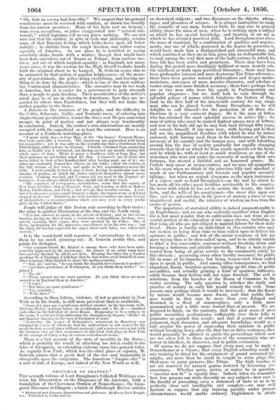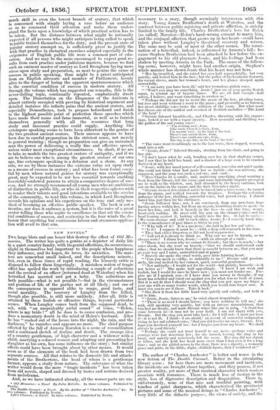]IROUGEAN ON ORATORY. * Tirn seventh volume of Lord Brougham's Collected
Writings con- tains his Dissertation on the Eloquence of the Ancients, with a translation of the Chersonese Oration of Demosthenes ; the Inau- gural Discourse at Glasgow; a batch of Edinburgh Review articles • • Rhetorical and Literary Dissertations and Addresses. By Henry Lord Brough- am. Published by Griffin and Co.
on rhetorical subjects ; and two discourses on the objects, advan- tages, and pleasures of science. It is always instructive to study the remarks of any man, however little he may rise in general ability above the mass of men, when he is writing upon a subject on which he has special knowledge, and treating of an art in which he has attained practical skill. Lord Brougham rises above the mass of mankind, by a combination of qualities and acquire- ments, any one of which, possessed in the degree he possesses it, would have made him a distinguished and successful man, and which combined as they are in him gives him an indisputable title to rank among the very first men of the half-century in which his busy life has been active and prominent. There may have been during this period more dazzlingly brilliant or more acutely sub- tile intellects at work upon periodical literature ; there may have been profounder lawyers and more dexterous Nisi Prins advocates; there have been greater natural philosophers and deeper mathe- maticians, statesmen of more massive character, and scholars of vaster range and more finished accuracy ; there have perhaps been one or two men who were his equals in Parliamentary and popular eloquence : but we shall look in vain through the splendid galaxy of names which brightens the history of Eng- land in the first half of the nineteenth century for any single man who can be placed beside Henry Brougham—as he still delights to call himself—for the possession of all these dis- tinctions in a very eminent degree. He is the man of letters who has attained the most splendid success in active life ; the man of action who must be ranked highest ammg men of letters; and now in his hale old age he may look back through fifty years, and console himself, if any man may, with having put to their full use the magnificent faculties with which he was by nature endowed, with having used them in the furtherance of the true interests of his country and the human race, and with beholding around him the face of society gradually but rapidly changing towards that ideal on which he from youth upwards set his heart, and by which he, with at least as much steadiness as any of the statesmen who were not under the necessity of making their own fortunes, has steered a faithful and an honoured course. Mr. Carlyle may sneer at stump-orators, and we may all sympathize in his scorn when we think of the atrocious folly and mischief of much of our Parliamentary and forensic and popular assembly talking ; but when we regard eloquence as the main instrument of a career such as Lord Brougham's—as the tool by which he has made all his other great faculties serviceable to his country, the lever with which he has set in motion the hearts, the intel- lects, and the wills of his countrymen—the sneer dies upon our lips, and we acknowledge in the power of oratory a force at once magnificent and useful, the minister of wisdom no less than the crown of genius.
The importance of oratorical ability is indeed unquestionable to an Englishman ; and no one who seriously consiaers what English life is but must wonder that its cultivation does not form an es- sential portion of the education of our upper classes' including in that term all who are not obliged to manual labour for their daily bread. There is hardly an individual in this country who may not reckon on being from time to time called upon to deliver his opinions in public ; and few of the minor vexations of life are more trying than to be thus called upon and to be utterly unable to utter a few consecutive sentences without breaking down and forming a ludicrous and pitiable spectacle. Many a man is pre- vented from being of great service to the community solely by this obstacle ; possessing every other faculty necessary for public life in some of its branches but being tongue-tied when called upon to speak in public. And among other consequences, we find impudent, fluent, brainless persons, taking up the time of public assemblies, and actually gaining a kind of spurious influence, solely because their betters will not come forward. The evil is notorious, from the benches of the House of Commons to the vestry. meeting. The only question is, whether the study and practice of oratory in early life would remedy the evil. Some persons may perhaps think it would be increased • that the fluent by nature would become more fluent, and. that public busi- ness would in that case be more than ever deluged and ,drowned in a flood of commonplace, only a little more grammatical and a little more formal than at present. We are disposed. to think, on the contrary, that the good sense of most public assemblies predominates sufficiently over their folly to guarantee us against this result ; and that if persons of sound Judgment, high character, and adequate knowledge, would as a rule acquire the power of expressing their opinions in public without breaking down after the first two or three sentences, they would generally be allowed to guide the proceedings which now are too often left to those members of the community who are lowest in intellect, in character, and in public estimation. Of course we do not suppose that every man can be made a Demosthenes or a Cicero ; that every English schoolboy could by any training be fitted for the attainment of grand oratorical tri- umphs, any more than he could be taught to write plays like Sha.kspere or paint pictures like Titian. The high reaches of art are reserved for natural genius fostered by favouring cir- cumstance. Whether poata, pietor, or orator be in question, " nascitur non fit" is equally true. Indeed, when we remember how few persons can write decently on any subject—how rare is the faculty of presenting even a statement of facts so as to be perfectly clear and intelligible and complete—we may well hesitate to suppose that any training possible under present circumstances would enable ordinary Englishmen to attain much skill in even the lowest branch of oratory, that which is concerned with simply laying a case before an audience so as to command their attention and, make them under- stand the facts upon a knowledge of which practical action has to be taken. But the distance between what might be rationally expected if all persons who might anticipate being called to speak in public trained themselves for the duty, and the present state of popular oratory amongst us, is sufficiently great to justify the wish that practice in rhetorical exercises adapted especially to the exigencies of English public life were a common part of edu- cation. And we may be the more encouraged to expect good re- sults from such practice under judicious masters, because we find such an eminent master of oratory as Lord Brougham laying more stress upon study and preparation, as next to genius the cause of success in public speaking, than might be a priori anticipated from an English advocate and member of Parliament, keenly alive to the danger of losing the apparent spontaneousness which is the essential condition of success in modern oratory. All through the volume which has suggested our remarks, this is the never-failing topic, continually repeated, emphatically dwelt upon. The Dissertation on the Eloquence of the Ancients is almost entirely occupied with proving by historical argument and detailed instance the infinite pains that the ancient orators, and especially Demosthenes, took to prepare beforehand and finish to the highest possible point of perfection those speeches which have made their name and fame immortal, as well as to furnish themselves generally with all the resources that long study and incessant practice could supply. Anything like extempore speaking seems to have been abhorrent to the genius of the two greatest ancient orators. Their success appears to have been due to careful preparation in the strictest sense, not merely to general training ; though no preparation can give an untrained man the power of delivering a really fine and effective speech, unless under most exceptional circumstances. In short, if we are to take as models the two greatest orators of antiquity, and if we are to believe one who is among the greatest orators of our own age, fine extempore speaking is a delusion and a sham. At any rate, we see by these instances the extreme value set upon study as a means of success in oratory ; and what has been found essen- tial by men whose natural genius for oratory was exceptionally great, may be expected to be not less essential towards enabling less richly-endowed persons to attain a comparative degree of suc- cess. And we strongly recommend all young men who are ambitious of distinction in public life, or who in their respective spheres wish to render their talents and good intentions available to the service of the community, to read this volume, in which Lord Brougham records his opinions and his experience on the true and only me- thod of becoming an effective public speaker. The book is not a treatise, nor does it embrace system, but it is the voice of a great orator telling those who aspire to excellence in that art the essen- tial conditions of success, and scattering to the four winds the de- lusion that anything but continuous labour and strenuous applica- tion will avail to that aim.



































 Previous page
Previous page